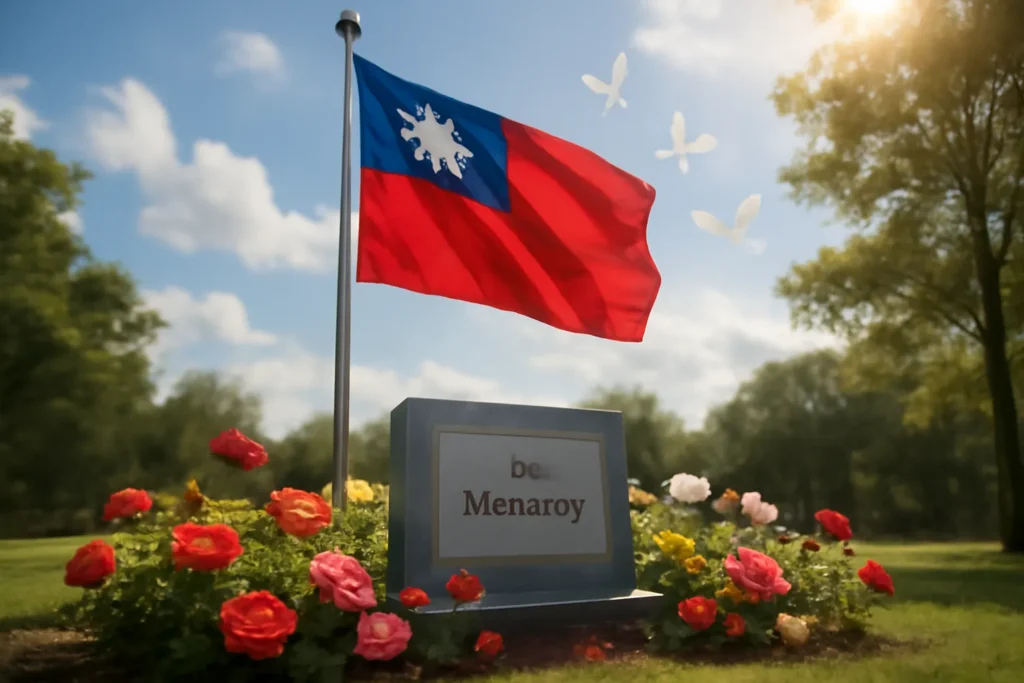History’s Shadow Over Taiwan: Commemorating VE Day with a Warning
How do you honor the lessons of the twentieth century in a world where their most chilling warnings feel freshly relevant? At the stately Taipei Guest House—once the seat of Japanese authority on the island—Taiwan marked its first official commemoration of Victory in Europe Day (VE Day), signaling not just a remembrance of fascism’s defeat, but a clarion call against burgeoning authoritarian threats today. The air was heavy with historical resonance: video footage of the D-Day landings flashed alongside the familiar timbre of Winston Churchill’s “We shall fight on the beaches.” The message was impossible to miss: History is not a relic—it’s a mirror held up to our present.
This 80th anniversary event, attended by diplomats from the UK and Europe, came at a moment of acute geopolitical unease. As President Lai Ching-te delivered his speech, Chinese warships prowled the Taiwan Strait and misinformation campaigns sought to cloud the coming elections. Meanwhile, President Xi Jinping stood shoulder-to-shoulder with Vladimir Putin in Moscow, underscoring a new axis of authoritarian camaraderie.
The echoes of the 1930s are hard to ignore, and Lai made sure no one left forgetting the stakes. Quoting General Dwight D. Eisenhower, he warned that safeguarding democracy requires strength, vigilance, and—above all—a refusal to appease aggression. Eisenhower, on the eve of Normandy, wrote of firm resolve; Lai, in the shadow of China’s expanding ambitions, invoked that same spirit. The parallels may be uncomfortable, but, as any student of history knows, they are never accidental.
An Island in the Crosshairs: Taiwan’s Struggle for Democracy
Across the past year, Taiwan has faced escalating military and political pressure from Beijing. Chinese fighter jets regularly breach Taiwan’s air defense zones, and warships conduct drills designed less for training than intimidation. Even digital infrastructure comes under threat as undersea cables, vital for Internet connectivity and commerce, experience suspicious outages and sabotage—a tactic increasingly linked to cyber-espionage and gray-zone warfare attributed to China.
Taiwan’s elections, a cornerstone of its vibrant democracy, have been targeted with a steady drip of misinformation spread via social media, echoing Russia’s digital interference in the United States and European Union. According to the Pew Research Center, over 60% of Taiwanese citizens now list electoral interference as one of their top concerns—a figure that has doubled since 2015. Lai, careful not to mention China or Russia by name, instead described a new “authoritarian bloc” that weaponizes information and technology to sabotage open societies from within.
“The message of history is clear,” Lai intoned. “Appeasing aggression only deepens the hunger for conquest.” His call was passionate and plainspoken, directed as much at foreign diplomats as to his own people. The world is watching to see if the lessons learned through the sacrifice of millions in Europe’s last great war will hold in the face of 21st-century threats.
“Those who indulge an aggressor’s appetite for expansion only encourage more, not less, aggression. We must never forget the costs of failing to stand together.” — President Lai Ching-te
Beyond that, Lai’s address linked Taiwan’s current struggles to those of nations once bullied by larger, more powerful neighbors: the Czechoslovakians and Poles facing the Nazi Blitzkrieg, the Baltic states pressed by Soviet might. Harvard political scientist Elizabeth Perry observes that Taiwan’s efforts mirror a broader pushback by small democracies against “a systematic campaign of coercion from revisionist authoritarian powers.” Her research highlights Taiwan as a test case—will the international community heed its warnings, or repeat the catastrophic mistakes of the 1930s?
Solidarity in a Fractured World: The Power and Peril of Democratic Alliances
A closer look reveals that Taiwan’s VE Day ceremony was about much more than symbolism. The presence of Ruth Bradley-Jones, the UK’s top representative, and Lutz Güllner, head of the European Economic and Trade Office, was a powerful reminder that democracies thrive not in isolation but through solidarity. Each speaker underscored that democratic resilience demands active collaboration—from sharing intelligence on cyber threats, to publicly supporting free elections, to expanding trade partnerships in the face of Beijing’s economic blackmail.
Taiwan’s outreach in recent months—including former President Tsai Ing-wen’s visits to Lithuania and Denmark and Foreign Minister Lin Chia-lung’s trip to Texas—demonstrates a commitment to be not just a passive recipient of Western support but a proactive partner. This echoes the Atlantic Charter’s ethos from 1941: mutual defense of rights, regardless of borders.
Of course, for all the history and high-minded talk, the reality remains grim. China’s aggression isn’t hypothetical. Neighboring Hong Kong’s freedoms have been systematically gutted. Military drills around Taiwan are increasingly routine. The world’s attention, so often prone to drift, risks repeating the mistakes of the past—mistaking temporary calm for genuine peace.
But, as President Lai asserted, hope is not lost. Democratic nations have shown remarkable ability to adapt and unite under threat. The transformation of Germany, Italy, and Japan into robust democracies is testament to the enduring power of freedom and resilience. The cautionary tales of the last century need not be prelude, if—and only if—we heed them now.
Can democracies respond with the vigor and unity the moment demands? Or will the next generation look back and wonder why we did not see the gathering storm? Taiwan’s stand on VE Day is not just a somber remembrance but a challenge issued to the world: confrontation with authoritarianism is no longer optional—it’s a historical imperative.

